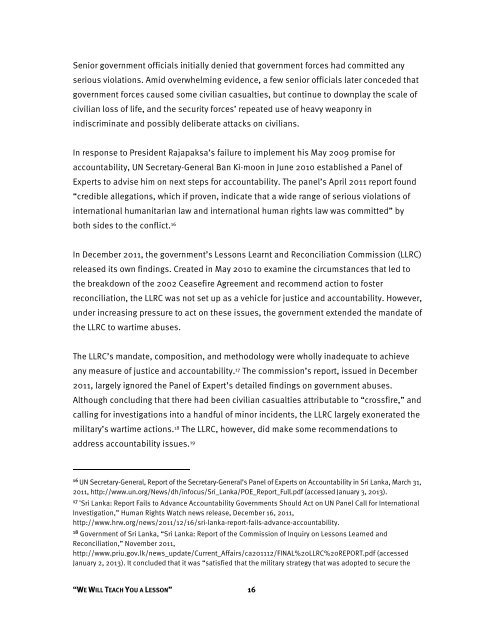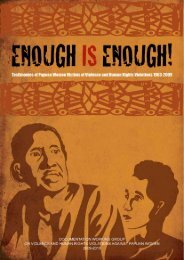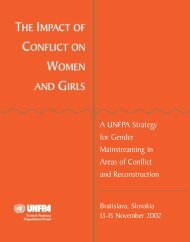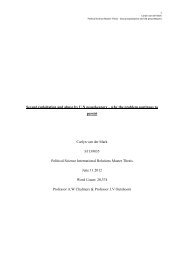Download the full report - Human Rights Watch
Download the full report - Human Rights Watch
Download the full report - Human Rights Watch
Create successful ePaper yourself
Turn your PDF publications into a flip-book with our unique Google optimized e-Paper software.
Senior government officials initially denied that government forces had committed any<br />
serious violations. Amid overwhelming evidence, a few senior officials later conceded that<br />
government forces caused some civilian casualties, but continue to downplay <strong>the</strong> scale of<br />
civilian loss of life, and <strong>the</strong> security forces’ repeated use of heavy weaponry in<br />
indiscriminate and possibly deliberate attacks on civilians.<br />
In response to President Rajapaksa’s failure to implement his May 2009 promise for<br />
accountability, UN Secretary-General Ban Ki-moon in June 2010 established a Panel of<br />
Experts to advise him on next steps for accountability. The panel’s April 2011 <strong>report</strong> found<br />
“credible allegations, which if proven, indicate that a wide range of serious violations of<br />
international humanitarian law and international human rights law was committed” by<br />
both sides to <strong>the</strong> conflict. 16<br />
In December 2011, <strong>the</strong> government’s Lessons Learnt and Reconciliation Commission (LLRC)<br />
released its own findings. Created in May 2010 to examine <strong>the</strong> circumstances that led to<br />
<strong>the</strong> breakdown of <strong>the</strong> 2002 Ceasefire Agreement and recommend action to foster<br />
reconciliation, <strong>the</strong> LLRC was not set up as a vehicle for justice and accountability. However,<br />
under increasing pressure to act on <strong>the</strong>se issues, <strong>the</strong> government extended <strong>the</strong> mandate of<br />
<strong>the</strong> LLRC to wartime abuses.<br />
The LLRC’s mandate, composition, and methodology were wholly inadequate to achieve<br />
any measure of justice and accountability. 17 The commission’s <strong>report</strong>, issued in December<br />
2011, largely ignored <strong>the</strong> Panel of Expert’s detailed findings on government abuses.<br />
Although concluding that <strong>the</strong>re had been civilian casualties attributable to “crossfire,” and<br />
calling for investigations into a handful of minor incidents, <strong>the</strong> LLRC largely exonerated <strong>the</strong><br />
military’s wartime actions. 18 The LLRC, however, did make some recommendations to<br />
address accountability issues. 19<br />
16<br />
UN Secretary-General, Report of <strong>the</strong> Secretary-General’s Panel of Experts on Accountability in Sri Lanka, March 31,<br />
2011, http://www.un.org/News/dh/infocus/Sri_Lanka/POE_Report_Full.pdf (accessed January 3, 2013).<br />
17 “<br />
Sri Lanka: Report Fails to Advance Accountability Governments Should Act on UN Panel Call for International<br />
Investigation,” <strong>Human</strong> <strong>Rights</strong> <strong>Watch</strong> news release, December 16, 2011,<br />
http://www.hrw.org/news/2011/12/16/sri-lanka-<strong>report</strong>-fails-advance-accountability.<br />
18<br />
Government of Sri Lanka, “Sri Lanka: Report of <strong>the</strong> Commission of Inquiry on Lessons Learned and<br />
Reconciliation,” November 2011,<br />
http://www.priu.gov.lk/news_update/Current_Affairs/ca201112/FINAL%20LLRC%20REPORT.pdf (accessed<br />
January 2, 2013). It concluded that it was “satisfied that <strong>the</strong> military strategy that was adopted to secure <strong>the</strong><br />
“WE WILL TEACH YOU A LESSON” 16




![IANSA [PDF, 2MB] - PeaceWomen](https://img.yumpu.com/25206379/1/190x123/iansa-pdf-2mb-peacewomen.jpg?quality=85)
![Commitments Sample [PDF, 93KB] - PeaceWomen](https://img.yumpu.com/25206331/1/190x245/commitments-sample-pdf-93kb-peacewomen.jpg?quality=85)










![A Toolkit for Advocacy and Action [PDF, 260KB] - Peace Women](https://img.yumpu.com/25205989/1/190x245/a-toolkit-for-advocacy-and-action-pdf-260kb-peace-women.jpg?quality=85)